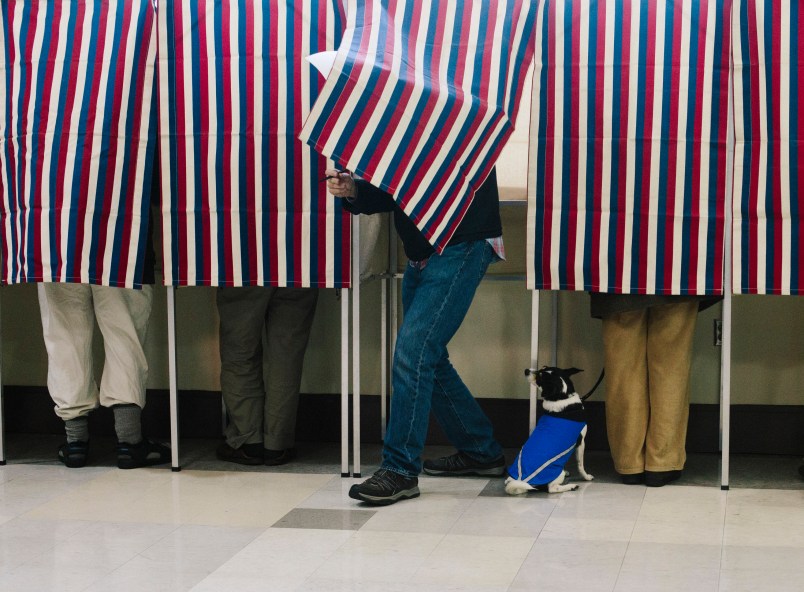PORTLAND, Maine (AP) — Maine residents are using ranked-choice voting for the first time on Tuesday and deciding whether to keep the voting system in place for the November general election.
The system, which lets voters rank candidates from first to last, is facing its biggest test yet in a statewide primary election. It is used in 11 local jurisdictions across the country.
Voters are using the system to sort through a crowded gubernatorial field that includes 11 candidates — seven Democrats and four Republicans who are looking to replace termed-out Republican Gov. Paul LePage. It’s also being used in the Democratic primary in the 2nd Congressional District, which covers most of Maine, and in the GOP primary in House District 75 west of the capital, Augusta.
Also on the ballot is a “people’s veto” question aimed at nullifying a legislative delay so that ranked-choice voting can be used in federal elections in Maine in November.
Many voters on Tuesday had a firm grasp of the ballot.
“It’s pretty easy to do, despite the negative publicity. I can count to seven, and they can do the math on the other end,” said David Kuchta, of Portland, referring to the number of candidate he ranked in the Democratic gubernatorial primary.
The voting system allows voters to rank their candidate preferences from first to last on the ballot. If there’s no majority winner, then there are additional voting rounds.
Supporters say the system ensures a majority winner, eliminates the impact of spoilers and encourages civility in campaigns. Opponents have charged that it’s confusing and doesn’t square with the Maine Constitution.
The system also has faced legal challenges. Maine’s highest court cleared the way in April for voters to use the ranking system.
Ranked-choice supporters gathered enough signatures to get the people’s veto question on the ballot after state lawmakers voted to delay ranked-choice voting until 2021, when it would be repealed unless allowed by a constitutional amendment.
The voting system can be used only in statewide primaries and in federal general elections in Maine. It can’t be used for legislative and gubernatorial general elections because of concerns it runs afoul of the Maine Constitution.
On Tuesday, several Democratic voters pointed to the election of LePage in 2010 for supporting the voting system. LePage won without a majority in a multi-candidate race in which Democrats torn between two other candidates split their votes.
A few were surprised to learn that new voting system won’t apply to that governor’s race in November, even if residents agree to carry it forward.
“Things take time, unfortunately. It’d be nice if thing went faster,” said Carmine Terracciano of Portland. “You gotta start somewhere.”







“Ranked choice voting” is easy. Deciding how to calculate the winner isn’t. There are multiple possible methods and mathematically, the “instant runoff” method seems to be among the worst, yet that’s what people mean when they say “ranked choice.” In Santa Fe’s first attempt at IRV in their mayoral race, it took 6-7 “rounds” of counting to figure out who won. Was that a mandate?
Then there are the details. Suppose there are three candidates, but you only want the one. You really don’t want the other two to get in. Do you just fill in the “1st” oval? Then you’ve gotten a single vote, where people who put in choices 1st, 2nd, 3rd in effect get three votes. Is that fair? Should your single vote be given more weight? (Ditto for 2 out of three).
An interesting experiment to be watched closely.
It does have the potential to result in more moderate candidates in an open primary…
I would love to see an analysis of this assuming a jungle primary format. At some level it may be possible to game the system by strategic voting combined with an unequal number of candidates between the parties.
That’s not how it works. Everyone has one vote, which may go to a different candidate depending on how the counting goes.
I’m in favor for a “none of the above” option in the rankings. You would rank the totally unacceptable candidates below that option. The Hugo Awards have a “No Award” option. There have been times when “No Award” won.
Borda Count or Approval Voting would be better methods for determining the winner.